Knowde Enhanced TDS
Identification & Functionality
- Active Component
- Food Ingredients Functions
- Pharma & Nutraceuticals Functions
Features & Benefits
- Benefit Claims (Health)
- Labeling Claims
- Food Ingredients Features
- Product Benefits
- Patented ingredient from citrus with benefits for heart health and sports performance.
- Improves physical performance and extends endurance.
- Maintains arterial flexibility and minimizes cardiovascular risk factors.
- Cardiose maintains Arterial Flexibility
Flow Mediated Dilation (FMD)
Flow-mediated dilation (FMD) is an accepted technique to quantify endothelial function, showing a predictive value for cardiovascular disease. To measure FMD, shear stress is induced by occluding the upper-arm for five minutes, followed by cuff release. Changes in blood flow cause an endothelial response that is assessed measuring artery diameter with ultrasound.Cardiose’s led to a significant improvement in FMD:
- In individuals with metabolic syndrome after supplementation of 500 mg/day Cardiose® for three weeks.
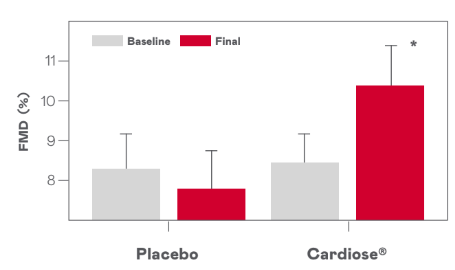
- After the intake of a high-fat meal in overweight individuals supplemented with Cardiose® (500 mg/day) for a period of six weeks.
Cardiose® also reduces the levels of systemic inflammation markers.
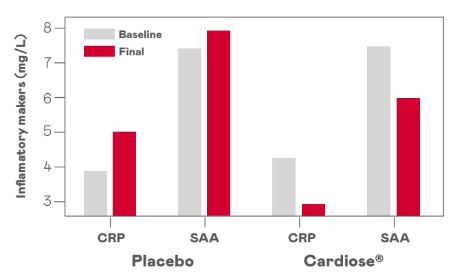
Laser Doppler Flowmetry and IontophoresisLaser Doppler Flowmetry uses laser light to measure red blood cell velocity and concentration, and therefore, to evaluate blood flux in microvasculature. The endothelium function in these micro-vessels is assessed by administering vasodilator agonists through the skin using small electrical currents (iontophoresis).
Cardiose® consumption causes a significant improvement in microvascular reactivity
In healthy, moderately overweight men, after acute consumption. The increase in blood flow was significantly correlated with the concentrations of hesperidin metabolites in blood plasma.
- Cardiose reduces Plaque Formation
Endothelial adhesion molecules are key components for the normal function of the cardiovascular system.
However, endothelial adhesion molecules like E-selectin, VCAM-1 and ICAM-1 are potent adhesion molecules that trigger platelets and white blood cells to stick to arterial walls.
Elevated serum concentrations of these cell adhesion molecules are related to cardiovascular disease (CVD)11. High levels of these molecules induce thrombus formation, and promote plaque formation, leading to atherosclerosis.
Cardiose® may modulate the altered concentration of these molecules:
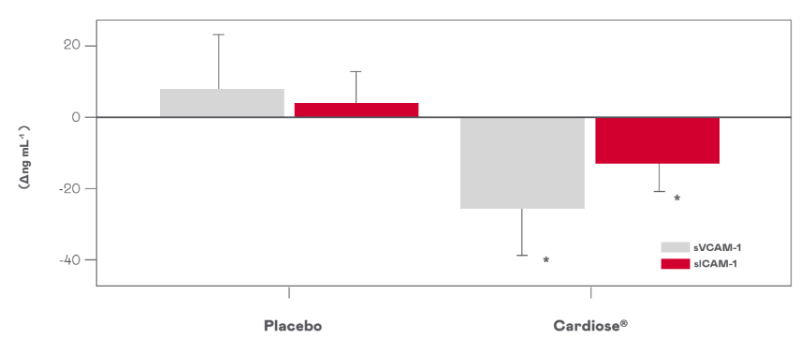
Adhesion molecule reduction following supplementationAfter four weeks of Cardiose® consumption (600 mg/day) E-selectin concentration decreased in patients suffering from myocardial infarction. In the same way, the three-week
Cardiose® supplementation (500 mg/day) led to a reduction of the circulating concentrations of soluble E-Selectin in individuals with Metabolic Syndrome.Six weeks of Cardiose® supplementation brought about a significant down-regulation of circulating soluble VCAM-1 and ICAM-1 molecules in an overweight population.
Applications & Uses
- Markets
- Food & Nutrition Applications
Properties
- Physical Form
- Appearance
- Light brown to yellowish powder
- Odor
- Characteristic
- Insoluble in
- Water
- Slightly Soluble in
- Alcohol
- Soluble in
- Diluted alkali
- Microbiological Values
- Assay
- Specifications
| Value | Units | Test Method / Conditions | |
| Total Plate Count | max. 10° | cfu/g | — |
| Total Yeast and Molds Count | max. 10 | cfu/g | — |
| Salmonella | Absence | /25g | — |
| Escherichia coli | Absence | /g | — |
| Value | Units | Test Method / Conditions | |
| Rutinoside (on anhydrous basis) | min. 90 | % | HPLC |
| Value | Units | Test Method / Conditions | |
| Loss on drying | max. 5 | % | — |
| Sulphated ash | max. 0.2 | % | — |
| Lead Content | max. 0.5 | ppm | — |
| Cadmium Content | max. 1 | ppm | — |
| Mercury | max. 0.1 | ppm | — |
| Arsenic Content | max. 0.2 | ppm | — |
| S Isomer | min. 85 | % | — |
Regulatory & Compliance
Technical Details & Test Data
- Identification
A. Infrared absorption spectrophotometry. Comparison: Working standard.
B. Examine the chromatograms obtained in the assay.
Results: the principal peak in the chromatogram obtained with the test solution is similar in retention time and size to the principal peak in the chromatogram obtained with working standard solution.- Cardiose Heart Health from the Mediterranean
Standard hesperidin consists of a mixture of S-and R-isomers. In nature the 2S-hesperidin is dominant.
Cardiose® has an S:R ratio that is closer to the natural form.Better bioavailability
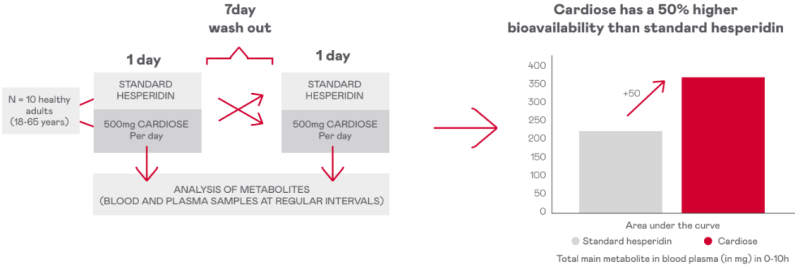
Distinctive positioning
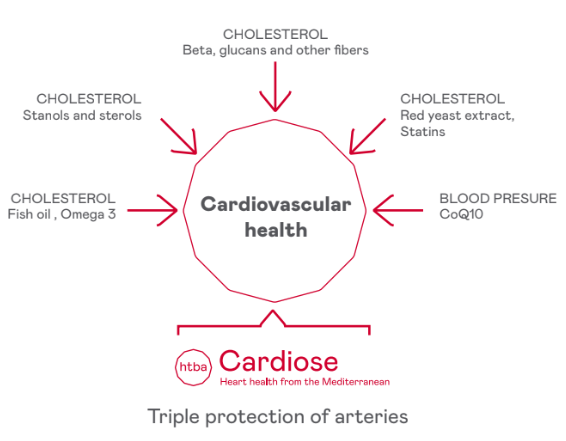
- Cardiose minimizes Cardiovascular Risk Factors
Elevated levels of cholesterol and fats put us at risk of experiencing serious cardiovascular events.
Impact on cholesterol levels- A three week treatment with Cardiose® (500 mg/day) in individuals with Metabolic Syndrome caused a significant:
- ↓ Total cholesterol.
- ↑ High-density lipoprotein (HDL).
- ↑ Apolipoprotein B, the main proteic component of LDL.
- Supplementation with Cardiose® (600 mg/day) in post-infarction subjects significantly increased HDL levels and decreased LDL levels.
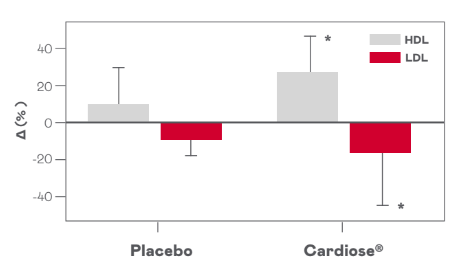
High blood pressure values are considered a major risk factor for cardiovascular diseases. The development of CVD can be prevented by lowering one’s blood pressure.Impact on blood pressure
- A four-week consumption of Cardiose® significantly lowered diastolic, but not systolic, blood pressure in moderately overweight healthy men.
- Similarly, a trend towards lower systolic and diastolic blood pressure was also observed after six weeks of Cardiose® supplementation in overweight individuals.
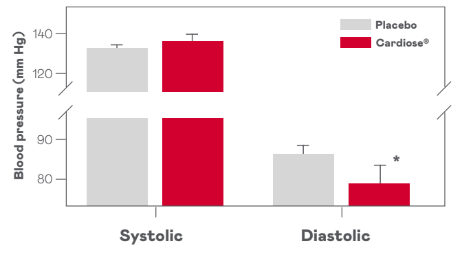
- A three week treatment with Cardiose® (500 mg/day) in individuals with Metabolic Syndrome caused a significant:

